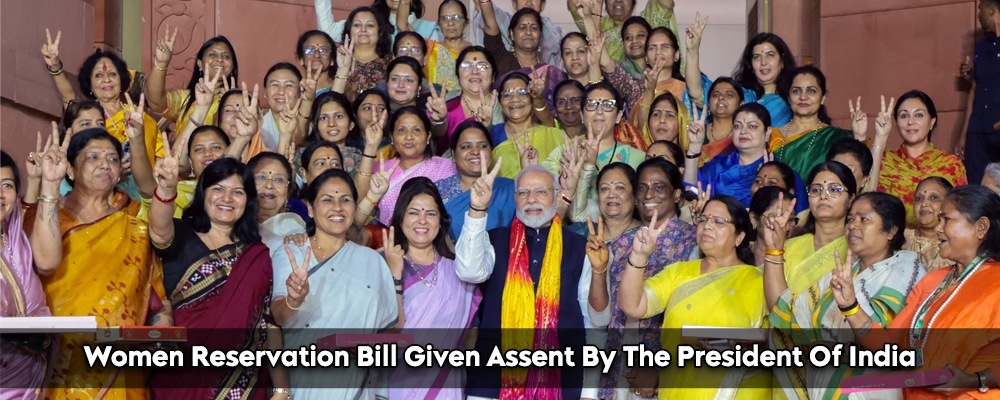The President of India gave assent to the Constitution (106th Amendment) Act 2023, providing 1/3rd reservation to women in Lok Sabha and State Legislative Assemblies.
The Bill was recently passed by the Parliament in a Special Session. Dated 21st September, the Bill was passed unanimously in the Rajya Sabha, and was passed by the Lok Sabha with 2/3rd majority of the members present and voting (454 Members supported it while 2 members opposed).
The Act would come into force on the date mentioned by notification in the Official Gazette by the Central Government.
Need A Legal Advice
The internet is not a lawyer and neither are you. Talk to a real lawyer about your legal issue

Constitution (106th Amendment) Act 2023
- The Constitution Amendment Bill sought to provide a 33 percent reservation for women in the Lok Sabha, state legislatures, as well as the Delhi legislative assembly.
- It has to be understood that the women’s reservation would be enforced only after the exercise of delimitation which would be done after the census which is to be conducted after its enactment.
- The women’s reservation would remain in operation for a period of 15 years from the day of its commencement.
Some of the main characteristics of the Bill, now the Act are-
- The 2023 bill proposed an amendment to one existing constitutional provision, which is Article 239AA (providing for special provisions with respect to Delhi), and also provided for introduction of three new articles namely Articles 330A, 332A which sought to introduce 33 percent in Lok Sabha and Article 334A- in the state legislative assemblies respectively.
- One of the main differences between the earlier bill and the constitutional amendment bill which was introduced recently, is that the Act is proposed to be enforced after the exercise of delimitation is done after the first census after the enactment of the bill is completed, although the sunset clause has been retained.
- Also the provisions related to the reservation for the Anglo-Indian community are left untouched, unlike in the bill introduced in 2008, where an amendment to Articles 331 and 333 was also proposed.
The Stand of the Opposition on the Bill
- In the Rajya Sabha, the opposition leaders supported the leading party in the lower house, hence, supporting the women’s reservation, however they questioned the clause regarding its implementation.
- The ‘delay’ in introducing the bill was also questioned despite the poll promise of the leading party to introduce reservation for women in union as well as in state legislatures, pointing out that the Bharatiya Janata Party had absolute majority in the Parliament.
- The opposition parties raised demands as well that the women’s reservation bill must be implemented immediately, hence urging the union government to dispense with the condition of conducting the census and delimitation exercise first.
- Another issue raised by the several members of the opposition parties was the non-inclusion of women from other backward classes (OBC) in the in the proposed amendment.
- While several members also demanded that a certain percentage of seats in the women’s quota must be reserved for women belonging to the minority communities.
The Women Reservation Bill in 2008
- The last bill regarding the reservation of the seats for women in the Lower House of the Parliament, state legislatures, as well as the Delhi legislative Assembly, was introduced over a decade ago, when the Rajya Sabha passed the Constitution (One Hundred and Eighth Amendment) Bill, 2008. However, the Bill lapsed after the 15th Lok Sabha (2009-14) was dissolved.
- The bill introduced in the year 2008 proposed amendments to three constitutional provisions –
- Article 239AA (Special provisions with respect to Delhi),
- Article 331 (Representation of the Anglo-Indian community in the House of the People), and
- Article 333 (Representation of the Anglo-Indian community in the Legislative Assemblies of the States).
- Also the Bill introduced three new articles, which are-
- Articles 330A, 332A- to introduce reservation for women in Lok Sabha and the state legislative assemblies, and
- 334A which contained a sunset clause that the reservation would be phased out after a period of 15 years.
In case you are involved in a court case or need some guidance or assistance for procedures related to legal matters, you may contact us at Lead India in case you wish to seek free legal advice or talk to a lawyer, as we offer you a team of highly talented advocates who have years long experience in dealing with matters related to civil law, criminal law, property matters, family law, etc.





 Talk to a Lawyer
Talk to a Lawyer